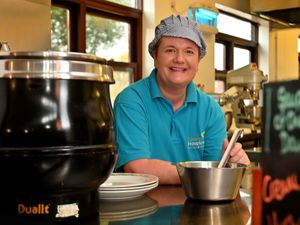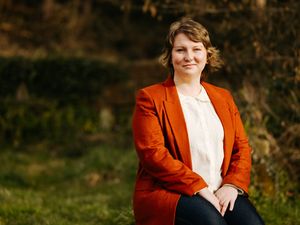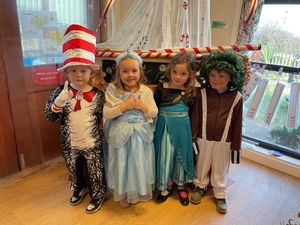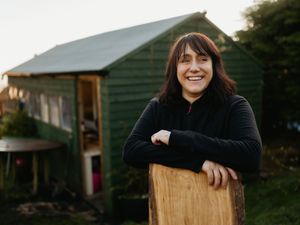The unsung heroes who keep Severn Hospice running
Phil Morris recalls his father Vivian's last days.

"He was diagnosed with bladder cancer in 2004, but he started to go downhill when my mum passed away in 2007," he says.
"In 2008 he passed away here."
Phil is speaking about Severn Hospice at Bicton Heath near Shrewsbury, where he works as a steward responsible for the general maintenance of the site.
His father spent 14 days in the hospice, but the care that he received left a great impression on him.
"He was made to feel so welcome," he says. "They talked us through the process that was going on, we were allowed to sit there with him all day.
"It's a sad time, but the nursing staff and doctors there made you feel comfortable, despite knowing what's going to happen. The treatment he had here, I couldn't fault it."
So when a job came up at the hospice – which also cared for his father-in-law two years later – Phil needed little persuasion in taking a drop in pay to give something back to the charity.
Phil is one of the many unsung heroes who work behind the scenes to ensure the patients at the hospice – which also has centres at Apley Castle in Telford and Newtown – receive the best possible experience during their final days.
His work may not be glamorous – "If they've got a blocked toilet in their room, we're on to it straight away" – but it is also crucial to the wellbeing of the patients. He is also the man who helps set up the marquees for the hospice's Lights of Love event on Sunday to commemorate lost loved ones.
And Phil, 63, makes sure that whatever he does, he does it with a friendly and cheery demeanour.
"I come into work every morning with a smile on my face," says Phil, who worked in building management for Shropshire Council before taking up his role at the hospice. "I do more hours than I used to, but I feel like I'm contributing."
The diehard Aston Villa fan loves swapping football banter with the patients and their families.
"We have got quite a few Villa fans here," he says. "I have had a lot of them talk about their memories of going down Villa Park in years gone by, but I talk to other football fans too. I've had chats with an 80-year-old bloke who used to go down to West Brom."
It is always a busy time at Severn Hospice, and particularly so during our visit, when the preparations for Christmas were in full swing. But the team who keep the wheels turning, day in, day out would not have it any other way.
Over in the kitchen at Bicton Heath, Amy Jackson has just finished serving up breakfast to the hospice's patients and staff, and attention is now turning to the evening meal.
"Dinner is chicken casserole and macaroni cheese," says Amy, who joined the hospice two-and-a-half years ago, having previously worked as a cook at Mereside Primary School in Shrewsbury.
"I get a lot of job satisfaction doing something nice for patients and family members," she says.
"Working at the school was a bit of a production line, but here you can make a real difference."
But while the Christmas dinner in December is an annual tradition, it was rustling up a Christmas meal in the middle of summer that sticks out in the mind when asked about her most memorable jobs.
"The patient wasn't expected to live to Christmas, and when you get a request like that, you will fulfil it," she says. "I'm told everyone really enjoyed it, that was lovely."
Amy recalls another patient, nearing the end of her life, who was struggling to eat solid foods.
"In her younger days she loved to bake lemon cheesecakes, and she wanted the taste in her mouth," she says. "I made her a small lemon cheesecake so she could enjoy the taste."
Amy's day starts at 7am, when she starts cooking the full English breakfast, which is normally served at 8am, although if a patient wants to eat a little later, her team will try to accommodate that, and if a patient asks for something different to eat, she will always make a special effort.
"One of the patients wanted some smoked salmon," she says.
Dinner is usually served at 5pm, and Amy says her team will try to reflect the profile of the different patients.
"A lot of the patients tend to be older, and they do like their traditional meals, but if we have got some younger patients in, we will look at sourcing meals more aimed at young people. They do tend to like their sandwiches."
Amy says many of the meals include vegetables grown in the garden, and much use is made of food donated from various harvest festivals in the area.
"If the patient wants something special, we will do our best," she says.
Amy says she is often moved by the stories behind the people who appear in the hospice, and feels a strong sense of duty to ensure that the patients have the best experience they possibly can.
"The stories you hear are really touching, and it makes you feel grateful for the life you have outside," she says.
"I always remember that it might be their last meal, so we always want it to be special."
For many patients, Abi White will be one of the most familiar faces at the hospice. A registered nurse of 14 years, she works on Perry ward at Bicton Heath.
“If I am on the early shift my day starts at 7.30am when we have handover," she says. "I welcome the team and assess the ward – we could have three patients, or we could have eight.
“Then we start the medicine round. Each patient is an individual and I think that is what makes hospice care different from being a patient in a hospital."
Abi says the hospice's high staff-to-patient ratio enables care to be tailored to the wishes and needs of the patients.
"If they want to have a bath in the middle of the day, we can do that, she says.
"But normally, after the medicine round we start on the personal care. And our day really is about making everything as comfortable as it can be for our patients and their families. If they want one of the us to sit with them for a couple of hours, we do. If they want to just be left alone, as long as they are ok and we can do our checks, we do that too.”
Abi, who worked in a coronary care ward before joining Severn Hospice, said it took about two years to adjust to the different environment.
“Here there are no beeping machines, rushing feet, or alarms," she says.
"At Severn Hospice I really do have time to care for my patients. "That’s not to say that in a hospital nurses do not, but here we have the time to really get to know them.
"A nurse in a hospital does the essential stuff, here I treat the whole person. We have time to talk, to learn about them and to understand exactly what they want.
“I love my job and I am so proud to work at Severn Hospice. I have made some amazing friends and I know I have the support of everyone I work with in what I do.
"It is an absolute honour to care for somebody at this stage of their life and it is an honour to be able to do that well.”
Val Blank was finishing gift wrapping parcels to go under the Christmas tree. A 'creative therapist', she works two days a week sharing her artistic skills with the patients, helping them to take their minds off their illnesses. Painting, drawing, knitting or crocheting, patients can try their hand at it all, as well as more unusual skills, such as decoupage, which involves using different layers of paper to create a three-dimensional work of art. Or sometimes they will just prefer to listen to music, or potter around the garden.
"Sometimes people do things they have never done before, it gives them the opportunity to relax when they try something new, and gives them a real sense of achievement," she says.
Val says that sometimes the patients wish to create a lasting memento for their loved ones.
"I do get an awful lot of satisfaction from seeing and hearing patients and their families enjoying their creative therapies," she says.
"I do love to see somebody absorbed in their work."
One patient, Jan, described how the creative therapy sessions at Bicton Heath helped her discover her own love of art.
"Just being at the creative therapy sessions helps me forget that I have cancer," she said.
"It started with me doing mosaics and that turned to printing, and I have even tried making stained glass. Three pieces of my print work will be exhibited in Shrewsbury."
Sarahlou Toni is one of four housekeepers employed by the hospice, and works on Alexandra ward at the Apley site.
She works two days a week, starting at 7.30am, when she is briefed on what each patient wants and what their dietary needs are.
“After breakfast and making sure that everyone has what they need, we double check that everything is ready for the day. There is always linen to fold, beds to make or sometimes we do a bit of flower arranging – we have some lovely flowers donated from nearby shops or delivered to the ward and we share them around so that everywhere has some.
“I love making sure that everything is spotless. I like to get to know everyone, and I really want to make sure that everyone is ok, not just the patients but also the staff and volunteers. Everyone here is really caring."
After lunch, which is served between 12pm and 2pm, it is back to cleaning and keeping on top of things.
She says: "I chat with visitors, helping them with whatever they need, sorting out rooms and sometimes, we have children visit. We have toys for them to play with.
“It is lovely here and we just don’t stop. We are busy all day, there is always something that needs personal attention."
As well as the four employed housekeepers, reporting to the housekeeping manager, there are also 14 volunteer ward housekeepers, although Sarahlou says the charity is always on the lookout for more.
"It is so busy and that is why our volunteers are priceless," she says. "It’s a very close team."
Sarahlou's shift officially ends at 3.45pm, but if she is talking to someone or working on something, she will always work over. She adds that the rooms are always kept ready in case there is another admission.
"They are lovely, we have soft linen and throws and each room on Alexandra ward is en suite and has a smart television, smart speaker and iPads," she says.
"We like to think of it as home from home – and we want to make everything as comfortable for our patients as we can."
There is also a guest room, which can sleep up to four should relatives want to stay, although visitors are always welcome to stay in their relatives’ room.
“I have always thought that how you leave this world is just as important as how you enter it," says Sarahlou.
"Sometimes that isn’t the case but to be part of a team that does its absolute best to make everything as good as it can be is a real honour.”
Sitting in his office at Bicton Heath, chaplain Harry Edwards holds a wooden heart in his hand.
"They are wooden holding hearts," he explains.
"We give them to a patients who is maybe getting frightened at night, when their loved ones go home,
"They are a reminder that you do not have to be in the room for your love to be with someone. Your love can be with that person when you are not in the room."
He tells the story of a small boy who wouldn't go to school because he was afraid of being parted from his dying father.
"He gave him a holding heart, and he was able to take it to school with him as a reminder of his dad's love," says Harry.
Harry is one of two full-time chaplains responsible for tending to the spiritual needs of patients and their families. While Harry is an ordained minister in the Church of England, he stresses that his work extends to people of all faiths, as well as those who have none.
They lead a bank of part-time chaplains and volunteers covering a range of different denominations and religions, and are able to point pretty much anybody in the right direction.
And sometimes, people just want a sympathetic ear to listen to their concerns.
"All people have a spiritual dimension to their life," he says.
"Not all people are religious,. some people will express their spiritual dimension through a religion, others will do it in different ways.
"I work with people's stories, and their questions about 'why me?'
"Everybody you meet is unique and of great worth in their own right, the more we work here, the richer our lives become."
Harry says sometimes patients are referred to him by the medical staff, when it is clear they would benefit from some spiritual support.
"I can't change things, but I think I can provide a safe ear to listen," he says.
"We are not here to preach religion to people, but if their religion is valuable to them we help them process their thoughts within a religious community that is important to them.
"We work at this hospice in a non-judgemental way, we have to respect what is important to the patients, to help them to achieve a level of comfort with their situation.
"We can be working with patients, or we can be working with a friend or relative. It is a privilege that people can allow us into their lives and their thoughts and feelings. If you can help them to feel more comfortable with their thoughts and their situation, that is very rewarding, I don't find it hard."
The chaplaincy team hosted a carol concert the week before Christmas, and activities for children have been lined up through the festive period.
Sadly, death does not take a day off even for Christmas, and losing a loved one can be particularly painful when everybody else is celebrating.
"I will always remember a 48-year-old lady who died on a Christmas Eve," says Harry.
"To see her children leaving the building, and suddenly realising they had got nothing in the kitchen for their Christmas meal was very sad. We will always be very helpful, and try our best to support people in these situations."
Most of the hospice's patients live in their own homes, and Harry goes out to meet many of them, or sometimes he will be in contact with them over the telephone.
Facing up to a life-limiting illness is invariably a traumatic experience, and just as every patient is an individual, the way each they handle such a situation will also be unique.
"Many people put on a brave face because they are protective towards their families, and there are other people who are so focused on their illness they are not able to keep a perspective when anything is positive," he says.
"Some people will plan every detail of what happens when they die, and there are other people who won't want to talk about it.
"We are a place of openness and honesty, and we encourage open and honest talk in a very gentle way."




